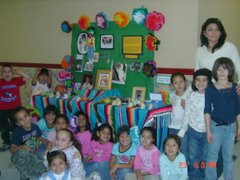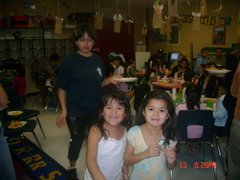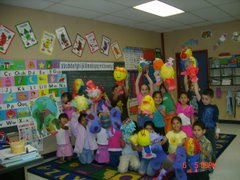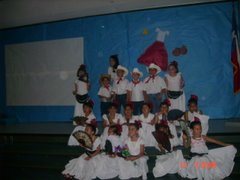Re the Whorfian hypothesis: Are there concepts or ways of saying things in one of the
languages that you speak that can not be said or expressed or the meaning changes in
another of your languages? How do you address culture in your classrooms? Do you go beyond the "holiday" model of culture?
Referring to the Whorfian hypothesis, is very common that ELLs make substitution in L2 with the intention of one meaning and the message gets distortion in the process. The use of slang is a very good sample of Whorfian hypothesis, because in different cultures and regions people uses slang words to refer to something, when the same terminology is translated, it doesn’t make sense. In Spanish we have many “dichos” that make sense when the person is familiar with the everyday language. However, if the same sayings are translated literally they lost the meaning. For example “El burro hablando de orejas”, this means that somebody is criticizing something and that person is making the same mistake. If we translate that phrase in English, “The donkey talking about ears” the meaning is totally lost. The same is for English; first time I hear “Is raining cats and dogs” I went to the window to see that, I didn’t know the meaning of it until they explained it to me. Another thing that comes to mind when reading Whorfian hypothesis is cognates or in this case false cognates, just because the word sounds and written almost the same that doesn’t mean that it has the same meaning.
Integrating culture in the classroom is something that as bilingual teachers should be considered in every day lessons. Living in a country where we have students from all over, and having so many languages and cultures integrated in here, it is absolutely necessary that we bring diverse cultures and traditions into the classroom. Exposing students to different forms of life will create in them the respect and value to other cultures and at same time it will instill pride in their own heritage, language and culture. In my classroom we not only celebrated the holidays, we read about different cultures in the world, even if we don’t have somebody from that culture in the classroom. My students learned how to appreciate different cultures, languages and people. During the year we learned about “Dia de los muertos”; we made “Calaveras” little skull, we placed an altar in the hall, with the cooperation of many staff members and other students that brought pictures of their love ones. We also celebrated Christmas in different ways and learned about Hanukah. Another celebration we learned about and my students were fascinated by it, was the Chinese New Year. The contrast of all celebrations and cultures made students comprehend better differences among people and how we can all work together to make life better.
Just to let you know, parent involvement and bringing families into the classroom is very important in all this process. Don’t forget, when parents are aware of what is happening in the classroom, and teachers make them part of that learning community, there are more probabilities that students get support from home and as consequence they can do better in school.
languages that you speak that can not be said or expressed or the meaning changes in
another of your languages? How do you address culture in your classrooms? Do you go beyond the "holiday" model of culture?
Referring to the Whorfian hypothesis, is very common that ELLs make substitution in L2 with the intention of one meaning and the message gets distortion in the process. The use of slang is a very good sample of Whorfian hypothesis, because in different cultures and regions people uses slang words to refer to something, when the same terminology is translated, it doesn’t make sense. In Spanish we have many “dichos” that make sense when the person is familiar with the everyday language. However, if the same sayings are translated literally they lost the meaning. For example “El burro hablando de orejas”, this means that somebody is criticizing something and that person is making the same mistake. If we translate that phrase in English, “The donkey talking about ears” the meaning is totally lost. The same is for English; first time I hear “Is raining cats and dogs” I went to the window to see that, I didn’t know the meaning of it until they explained it to me. Another thing that comes to mind when reading Whorfian hypothesis is cognates or in this case false cognates, just because the word sounds and written almost the same that doesn’t mean that it has the same meaning.
Integrating culture in the classroom is something that as bilingual teachers should be considered in every day lessons. Living in a country where we have students from all over, and having so many languages and cultures integrated in here, it is absolutely necessary that we bring diverse cultures and traditions into the classroom. Exposing students to different forms of life will create in them the respect and value to other cultures and at same time it will instill pride in their own heritage, language and culture. In my classroom we not only celebrated the holidays, we read about different cultures in the world, even if we don’t have somebody from that culture in the classroom. My students learned how to appreciate different cultures, languages and people. During the year we learned about “Dia de los muertos”; we made “Calaveras” little skull, we placed an altar in the hall, with the cooperation of many staff members and other students that brought pictures of their love ones. We also celebrated Christmas in different ways and learned about Hanukah. Another celebration we learned about and my students were fascinated by it, was the Chinese New Year. The contrast of all celebrations and cultures made students comprehend better differences among people and how we can all work together to make life better.
Just to let you know, parent involvement and bringing families into the classroom is very important in all this process. Don’t forget, when parents are aware of what is happening in the classroom, and teachers make them part of that learning community, there are more probabilities that students get support from home and as consequence they can do better in school.
.JPG)




3 comments:
Erika
Me das mucha ambicion por ensenar a los ninos. Me da gusto de ver como maestras como tu se dedican a ensenar a los ninos tener un orgullo propio para que sepan quienes son. Necesitan tener una identidad para que como tu dices tengan orgullo en simismos. Gracias por las ideas!
Erika
Me das mucha ambicion por ensenar a los ninos. Me da gusto de ver como maestras como tu se dedican a ensenar a los ninos tener un orgullo propio para que sepan quienes son. Necesitan tener una identidad para que como tu dices tengan orgullo en simismos. Gracias por las ideas!
Hola Erika,
Muchisimas gracias por tus lisonjas sobre mi lenguage. Entonces, intentare clarificar mis respuestos a tus preguntas en una idioma que me gusta; pero yo se he perdido mucho desde el tiempo en que lo hablaba cada dia! Tambien, los accentos me faltan.
Creo que tengo un accento "neutral" porque vivi en muchos lugares del mundo, y en los EEUU. Tambien, el accento tiene un prestige, y venir de Francia a Arkansas, no queria hablar como los indiginos! Snobismo? Quizas, pero no me senti comoda en ese ambiente. Tambien, porque era executiva en una empresa farmaceutica, era una necesidad de presentar una cara professional, y eso incluyo el acento y eloquencia para sobrevivir y tener promociones. Tambien trabajar internacionalmente con los professionales de marketing, hablar con claridad en un acento neutral apoyo la communicacion y la cooperacion.
Ensene el ingles (en Japon y en Alemania. Tambien queria dar a los clientes, la mayoria adultos y professionales, el ingles mas "caro" con un acento reducido.
Me gusta mucho su presencia, nos enriquece la clase, y su blog. Me gusta tambien conocerte mejor, que pueda aprender mucho de ti.
Carol
Sorry, I know my Spanish does not meet the standard, but I am grateful to you for helping me to practice. You are very gracious!
Post a Comment